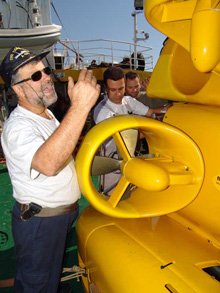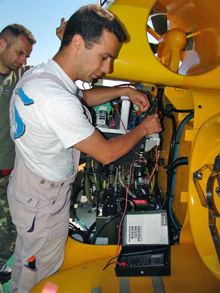
Team members Thodoros Fotopulos, Aggelos Mallios, and Vasilis Stasinos inspect the Thetis submersible. Click image for larger view and image credit.
Vasilis Stasinos (left) watches electrical engineer Aggelos Mallios check Thetis' electrical systems after a ground fault alarm triggered during a previous dive. Click image for larger view and image credit.
Safety First
June 29, 2006
36 N, 24 E
Dr. Richard Camilli
Co-Principal Investigator — Project PHAEDRA 2006
Safety always comes first when researchers use technology that harbors human lives. The human-occupied vehicle (HOV) Thetis is one such piece of technology. That's why we conduct a pre-dive checkout before every single Thetis dive. We want to ensure that the vehicle is working appropriately, and is safe to carry human lives. Following this morning’s pre-dive checkout, today’s Thetis dive was aborted.
During the pre-dive checkout we performed systems tests, but were unable to establish a reliable data connection between the submersible’s internal computer and the sensors. We were on pins and needles because a ground fault alarm (an early warning of potential damage to the electrical systems) had been triggered during a previous dive. Kostas Katsaros, Aggelos Mallios, and Thodoros Fotopulos spent the rest of that day inspecting the submersible. The warning alarm stopped after they cleaned all of the electrical contacts and replaced a questionable electronic relay (transmitter). Today’s communications problem did not appear to be related to the previous day’s problem, but we decided to scrub the mission until we could identify where the problem was originating.
In the end, the problem was just a simple radio wave interference caused by a cable from the submersible’s hydraulic systems being too close to our communications cable. This problem is comparable to what happens when a radio or television displays static from another electrical device, such as a kitchen blender or a vacuum cleaner. The interference disappears when the submersible is in seawater, because radio waves cannot penetrate seawater. This effect (known as shielding) is very helpful for the sensors because it allows them to measure faint signals accurately, similar to the way that it is easier to hear a whisper in a quiet room than in a noisy one.
As of this writing, the Thetis is cleared as safe for diving, and should be back in the water tomorrow.
Sign up for the Ocean Explorer E-mail Update List.


















